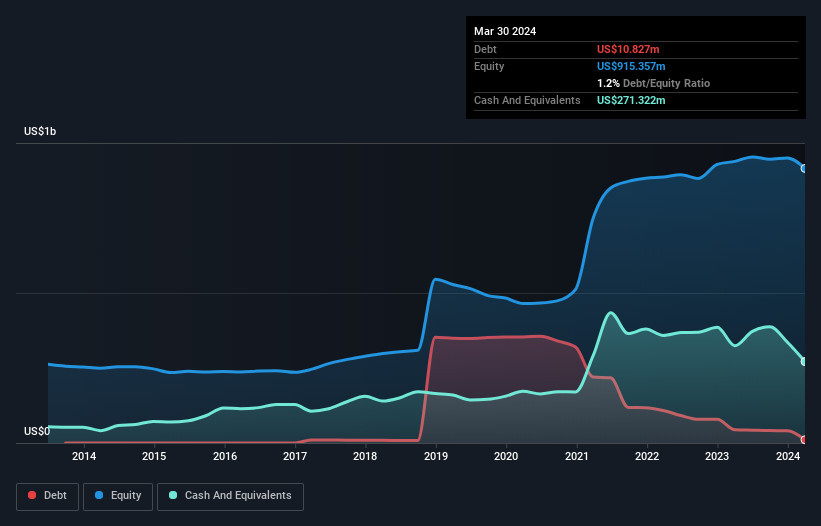- United States
- /
- Semiconductors
- /
- NasdaqGS:COHU
These 4 Measures Indicate That Cohu (NASDAQ:COHU) Is Using Debt Reasonably Well
David Iben put it well when he said, 'Volatility is not a risk we care about. What we care about is avoiding the permanent loss of capital.' So it seems the smart money knows that debt - which is usually involved in bankruptcies - is a very important factor, when you assess how risky a company is. As with many other companies Cohu, Inc. (NASDAQ:COHU) makes use of debt. But should shareholders be worried about its use of debt?
What Risk Does Debt Bring?
Debt and other liabilities become risky for a business when it cannot easily fulfill those obligations, either with free cash flow or by raising capital at an attractive price. If things get really bad, the lenders can take control of the business. However, a more frequent (but still costly) occurrence is where a company must issue shares at bargain-basement prices, permanently diluting shareholders, just to shore up its balance sheet. Of course, debt can be an important tool in businesses, particularly capital heavy businesses. The first thing to do when considering how much debt a business uses is to look at its cash and debt together.
View our latest analysis for Cohu
What Is Cohu's Net Debt?
You can click the graphic below for the historical numbers, but it shows that Cohu had US$10.8m of debt in March 2024, down from US$44.1m, one year before. However, it does have US$271.3m in cash offsetting this, leading to net cash of US$260.5m.

How Healthy Is Cohu's Balance Sheet?
We can see from the most recent balance sheet that Cohu had liabilities of US$91.1m falling due within a year, and liabilities of US$68.0m due beyond that. Offsetting these obligations, it had cash of US$271.3m as well as receivables valued at US$116.0m due within 12 months. So it can boast US$228.2m more liquid assets than total liabilities.
This excess liquidity suggests that Cohu is taking a careful approach to debt. Given it has easily adequate short term liquidity, we don't think it will have any issues with its lenders. Succinctly put, Cohu boasts net cash, so it's fair to say it does not have a heavy debt load!
It is just as well that Cohu's load is not too heavy, because its EBIT was down 93% over the last year. When a company sees its earnings tank, it can sometimes find its relationships with its lenders turn sour. The balance sheet is clearly the area to focus on when you are analysing debt. But it is future earnings, more than anything, that will determine Cohu's ability to maintain a healthy balance sheet going forward. So if you're focused on the future you can check out this free report showing analyst profit forecasts.
Finally, a business needs free cash flow to pay off debt; accounting profits just don't cut it. Cohu may have net cash on the balance sheet, but it is still interesting to look at how well the business converts its earnings before interest and tax (EBIT) to free cash flow, because that will influence both its need for, and its capacity to manage debt. During the last three years, Cohu generated free cash flow amounting to a very robust 100% of its EBIT, more than we'd expect. That puts it in a very strong position to pay down debt.
Summing Up
While we empathize with investors who find debt concerning, you should keep in mind that Cohu has net cash of US$260.5m, as well as more liquid assets than liabilities. The cherry on top was that in converted 100% of that EBIT to free cash flow, bringing in US$57m. So is Cohu's debt a risk? It doesn't seem so to us. There's no doubt that we learn most about debt from the balance sheet. However, not all investment risk resides within the balance sheet - far from it. Be aware that Cohu is showing 1 warning sign in our investment analysis , you should know about...
If you're interested in investing in businesses that can grow profits without the burden of debt, then check out this free list of growing businesses that have net cash on the balance sheet.
New: AI Stock Screener & Alerts
Our new AI Stock Screener scans the market every day to uncover opportunities.
• Dividend Powerhouses (3%+ Yield)
• Undervalued Small Caps with Insider Buying
• High growth Tech and AI Companies
Or build your own from over 50 metrics.
Have feedback on this article? Concerned about the content? Get in touch with us directly. Alternatively, email editorial-team (at) simplywallst.com.
This article by Simply Wall St is general in nature. We provide commentary based on historical data and analyst forecasts only using an unbiased methodology and our articles are not intended to be financial advice. It does not constitute a recommendation to buy or sell any stock, and does not take account of your objectives, or your financial situation. We aim to bring you long-term focused analysis driven by fundamental data. Note that our analysis may not factor in the latest price-sensitive company announcements or qualitative material. Simply Wall St has no position in any stocks mentioned.
About NasdaqGS:COHU
Cohu
Through its subsidiaries, provides semiconductor test equipment and services in the United States, China, Malaysia, the Philippines, Singapore, and internationally.
Excellent balance sheet and good value.
Similar Companies
Market Insights
Community Narratives




